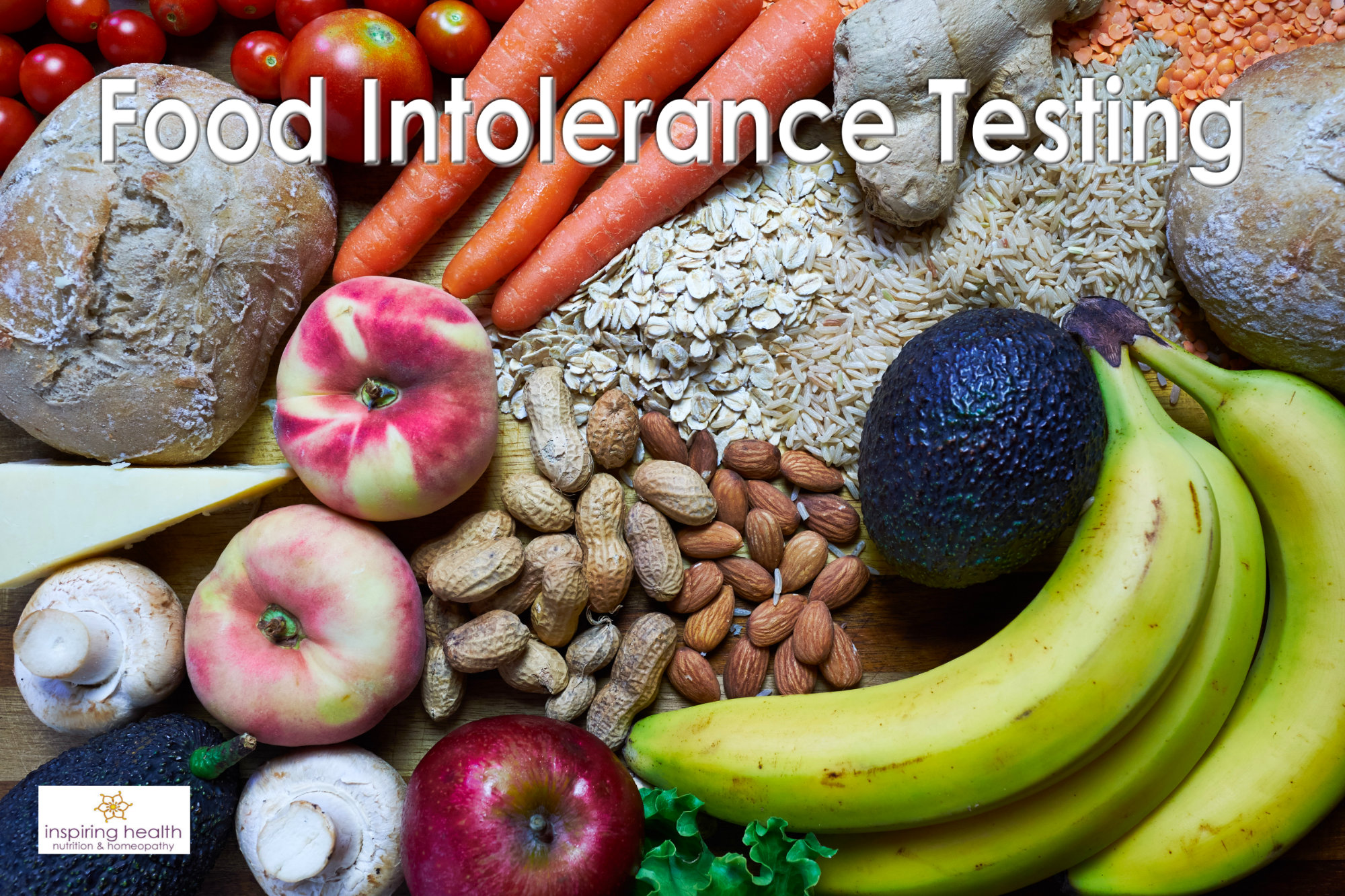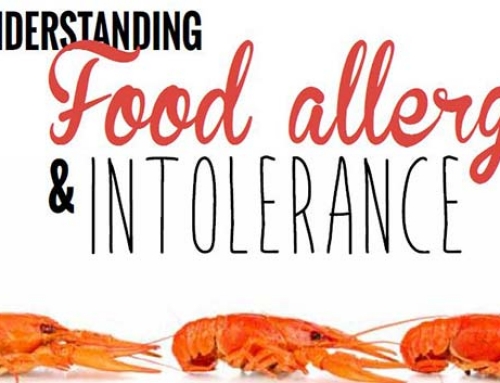The Benefits of Food Intolerance Testing
Food intolerance can cause a wide variety of symptoms which typically occur anywhere between 8-72 hours after eating the offending foods. This delayed onset and long time period can make it quite a challenge to identify which foods are effecting you. In this situation, food intolerance testing can be a useful tool to help uncover your personal dietary triggers. The offending foods can then be temporarily removed or reduced to give your body a chance to heal. This is important because repeatedly consuming irritating foods can lead to a constant state of inflammation. For example, if you are intolerant to wheat but you eat it several times a day, your body is not being given the opportunity to repair the damage caused by eating wheat.
To achieve long term health it is also important to address the underlying causes of food intolerance such as increased intestinal permeability (leaky gut) and loss of immune tolerance. Temporarily removing offending foods makes it easier to resolve these issues and facilitates deeper healing.
The difference between Food Allergy and Food Intolerance
Before we delve further into the subject of food intolerance testing it would be helpful to outline the main differences between food allergy and food intolerance. There is often confusion about food allergy and food intolerance with the terms being used interchangeably. However, they differ in several ways.
Food Allergy
True food allergy is an immune based reaction involving IgE antibodies which trigger an inflammatory response involving the release of histamine and cytokines. The symptoms typically occur quickly after eating the offending food (within minutes to a couple of hours). At it’s most extreme, this type of reaction is responsible for anaphylaxis, for example, in the case of peanut allergy. However, symptoms can also be less severe and may include itchy lips, throat or tongue, blocked nose, headaches, stomach pain, diarrhoea, bloating, gas and sudden fatigue. As the symptoms occur quickly, it is often easy to identify the trigger.
Food Intolerance
Food intolerance also involves an immune system reaction but in this case IgG antibodies are released rather than IgE antibodies. IgG antibodies attach to food antigens forming an immune complex. These presence of these immune complexes in the body triggers the release of pro inflammatory cytokines which can contribute to diverse symptoms including the 5 conditions discussed below. Food intolerance differs from food allergy as there is a delayed reaction with symtpoms occurring anywhere from 8- 72 hours after eating the offending food(s). As a result, it can be extremely difficult to identify the triggers without help. In this situation food intolerance testing may help provide clarity.
Other types of food intolerance
Food intolerance testing is a useful tool for immune based IgG reactions. However, it is also possible to suffer from different kinds of food reactions which these tests would not detect. An example of this is lactose intolerance which is caused by a lack of the enzyme lactase needed to digest lactose. Or in some cases, bloating after meals may result from insufficient stomach acid and digestive enzymes rather than the effect of IgG antibodies. Non immunological food reactions also include sensitivities to histamine, tyramine, sulfites, salicylates, monosodium glutamate and aspartame.¹
Food intolerance testing has been supported by scientific studies for use in the following 5 conditions:
1. Autoimmune Disease
The “immune complexes” which are formed by the union of IgG antibodies and the food antigens are known to be involved in autoimme disease.
An observational study carried out in 2018 found that people with Autoimmune Disease (AI) had a much higher level of IgG food intolerance compared with controls. The authors concluded that “food intolerance testing is a very important tool in patients with AI disease, and should be performed in each patient to tailor an individual diet program, which if properly followed, could relieve symptoms and probably stop or slow the the progression of the autoimmune disease.” (Couke F.)
Another 2018 study found that patients in China with Crohn’s Disease had significantly increased food-specific IgGs against egg, milk, wheat, corn, rice, tomato, codfish, and soybean.³
2. Irritable Bowel Syndrome
Studies 4-5 show that food intolerance can affect up to 70% of people with Irritable Bowel Syndrome and diets eliminating IgG antibodies against specific food has been shown to be effective for some people suffering from IBS.
3. Depression
Scientific evidence is increasingly demonstrating the effect of a disturbed gut-brain axis in neuro psychological disturbances, including depression. Factors involved in this disturbance include changes in the mucosal immune system, disruption of the microbiome, exposure to xenobiotics, gut permeability and food IgG antibodies. 6
4. Skin Conditions
IgG mediated food intolerance has been implicated in skin rashes such as eczema and urticaria. 7-8
5. Migraine
It is well known that certain foods can trigger migraines in susceptible people through a variety of mechanisms but not everyone reacts to the same foods. IgG food intolerance testing can help to uncover personal dietary triggers. One double blind, random, cross-over trial found that the avoidance of IgG food antigens identified via ELISA food intolerance testing resulted in a statistically signficant reduction in the number of migraine days and the number of attacks.9
Which test is right for me?
Having reviewed and compared many food intolerance tests over the years, there are two companies in particular that I recommend.
Cambridge Nutritional Sciences (CNS) Food Print
CNS offer an extensive range of comprehensive food intolerance tests, suited to different dietary needs and budgets. The CNS Food Print sample collection can be done in the comfort of your own home.
The VEGAN and VEGETARIAN panels are an exciting addition to their range because the panel includes foods that you are likely to be eating regularly as a vegan or vegetarian . Afterall, there isn’t any point in paying for a panel including meat and fish if you never eat them!
You can view the CNS Food Print tests using the link below. There are also sample reports, an instructional video for sample collection, Q&A’s and extensive information about food intolerance testing available on the website.
https://camnutri.com/collections/food-tests
Take advantage of 15% off CNS Food Print tests using code FPBLOG when ordering*
* The Food Print Indicator test(£15) is not included in this offer.
Brunel Health
As an approved Brunel Health Practitioner and I can arrange a comprehensive food intolerance test for you which includes 134 food and drinks. The test is extremely easy to do in the convenience of your own home and Brunel offer a super fast turnaround time of just 3 days.
Features
This test covers 10 food and drink categories so it is great for people who eat a varied diet:
- Grains & Staples
- Dairy & Eggs

- Meat & Fish
- Nuts, Seeds and Beans
- Herbs, Spices & Oils
- Vegetables
- Fruit
- Drinks
- Alternative Milks – soya, coconut, rice, oat, hemp, almond, rice, hazel, cashew
- Protein Supplements – casein, hemp, pea, rice, soy, whey
- and many others
You can view the brochure here
There is also a 3 minute video showing you how to do the test https://brunelhealth.com/showme
Price: £179
Brunel Health food intolerance test is available in the Uk and also in Europe as they use a dry blood sample.
To order the test please get in touch with me via email, phone or facebook message and I will arrange it for you.
tanya@inspiringhealth.co.uk
00351 966583689
https://www.facebook.com/inspiringhealthnutritionandhomeopathy/

What else do I need to know before taking a food intolerance test?
Medication
If you are taking immunosuppressant medication it may effect the test results as this type of medication may decrease the IgG response. It is best to speak to the lab or your Practitioner about this when considering the test. It is very important that you do not stop taking any prescribed medication.
Pregnancy
Food intolerance testing is not recommended during pregnancy as the immune system is suppressed leading to potentially false negatives. However, the test can usually be done 6-8 weeks after giving birth.
Preparing for the test
In general, it is best to follow your usual diet before the test so that the results will reflect what you usually eat. However, if you have avoided a foods for more than three months that you would like tested, it is best to reintroduce them . For example, if you have been avoiding wheat but would like it tested, eat a normal portion of wheat at least once daily before taking your blood sample. If symptoms occur once the food is re-introduced this suggests that you are still intolerant to it and you should discontinue it.
² Couke F ; Autoimmun Rev. 2018 Nov;17(11):1078-1080. doi: 10.1016/j.autrev.2018.05.011. Epub 2018 Sep 11. Food intolerance in patients with manifest autoimmunity. Observational study.
4 Atkinson W1, Sheldon TA, Shaath N, Whorwell PJ Food elimination based on IgG antibodies in irritable bowel syndrome: a randomised controlled trial. Gut. 2004 Oct;53(10):1459-64. https://www.ncbi.nlm.nih.gov/pubmed/15361495
5 Sameer Zar, Lynne Mincher, Martin J. Benson & Devinder Kumar Food-specific IgG4 antibody-guided exclusion diet improves symptoms and rectal compliance in irritable bowel syndrome. https://www.ncbi.nlm.nih.gov/pubmed/16109655
6 Karakula-Juchnowicz H, Gałęcka M, Rog J, et al. The Food-Specific Serum IgG Reactivity in Major Depressive Disorder Patients, Irritable Bowel Syndrome Patients and Healthy Controls. Nutrients. 2018;10(5):548. Published 2018 Apr 28. doi:10.3390/nu10050548 https://www.ncbi.nlm.nih.gov/pmc/articles/PMC5986428/
7 Shakoor Z, AlFaifi A, AlAmro B, AlTawil LN, AlOhaly RY. Prevalence of IgG-mediated food intolerance among patients with allergic symptoms. Ann Saudi Med. 2016;36(6):386–390. doi:10.5144/0256-4947.2016.386 https://www.ncbi.nlm.nih.gov/pmc/articles/PMC6074204/
9 Alpay K, Ertas M, Orhan EK, Ustay DK, Lieners C, Baykan B. Diet restriction in migraine, based on IgG against foods: a clinical double-blind, randomised, cross-over trial. Cephalalgia. 2010;30(7):829–837. doi:10.1177/0333102410361404 https://www.ncbi.nlm.nih.gov/pmc/articles/PMC2899772/




